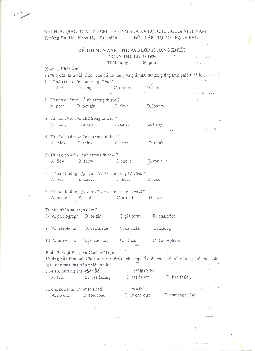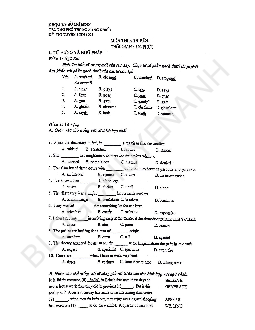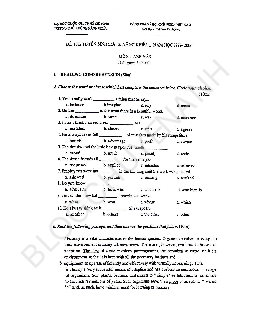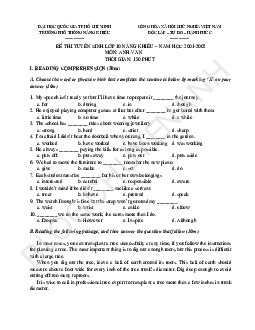




Preview text:
Mark the letter A, B, C, or D on your answer sheet to indicate the word whose underlined part differs from
the other three in pronunciation in each of the following questions. (0.5 point)
Question 1. A. century B. family C. nearby D. journey A.ˈsentʃəri B. ˈfæməli. C.ˌnɪrˈbaɪ D . ˈdʒɝːrni
Question 2. A. wanted B. walked C. ended D. started A.ˈwɑːnt̬ɪd B. wɑːkt C. endɪd D. stɑːrtɪd
Read the following passage and mark the letter A, B, C, or D on your answer sheet to indicate the correct
answer to each of the questions
While the western New Year is celebrated to some degree in Korea today, the traditional Korean or Lunar New
Year, which usually falls at some point in early January or February, is still more important.
The exact dates of the three- day celebration are determined by the phases of the moon and the beginning
of festivities takes place on the first day of the second new moon. It is a very family- centred affair, which
normally sees Koreans return to their hometowns to visit their parents and other relatives, and to perform
an ancestral ritual called “charye”.
The first day is marked by a big meal. Family members usually dress in colourful traditional clothes
known as Hanbok. The family- oriented theme continues throughout the festival, and a number of other
customs are practiced during the three days, including the building and later, burning of moon houses
which are made of firewood and branches. The destruction of the moon houses is a symbolic act intended
to keep off evil spirits for the New Year.
Question 3. The word “their” in paragraph 1 refers to . A. relatives B. hometowns C. festivities D. Koreans
Question 4. The word “keep off” in paragraph 2 is closest in meaning to . A. mention B. come C. touch D. prevent ●
keep off (phr verb)= prevent (v): ngăn cản, ngăn chặn ● Mention (v):Đề cập đến ● Come (v): đến ● Touch (v):Chạm vào
Question 5. According to the passage, which of the following is TRUE? A.
The exact dates of the three- day celebration are determined by the phases of the sun B.
The moon houses are made of brick C.
The significance of the traditional Korean New Year outweighs that of the western New Year D.
The traditional Korean New Year is not a very family- centred affair.
● Key: While the western New Year is celebrated to some degree in Korea today, the traditional
Korean or Lunar New Year, which usually falls at some point in early January or February, is still more important.
Question 6. According to the last paragraph, what is the purpose of burning of the moon houses?
A. to ward off evil spirits
B. to observe the New Year
C. to return to the countryside D. The Hanbok ●
Key: The destruction of the moon houses is a symbolic act intended to keep off evil spirits for the New Year. ●
Ward off (phr verb) = prevent: ngăn ngừa
Question 7. Which of the following is the best title for the passage? A.
The destruction of the moon houses Sự tàn phá của những ngôi nhà trên mặt trăng
B. The Korean New Year Tết Hàn thực
C. The western New Year Tết Tây
D. been only used in business chỉ được sử dụng trong kinh doanh
Mark the letter A, B, C or D to indicate the correct answer that best completes each unfinished
sentence; best substitutes the underlined part; or has the same meaning to the sentence given.
Question 8. She really enjoys
shopping with her friends at the weekends. A. to go B. going C. goes D. to going ●
Enjoy doing smt: thích làm gì Question 9. The car
he has just bought is very expensive. A. whose B. which C. who D. that ●
Đại từ quan hệ “which ” thay thế cho “the car” Question 10. She to Ho Chi Minh last year. A. went B. has gone C. had gone D. goes
Question 11. Mary: “Aunty, I’ve passed the exam with flying colours.”Dì ơi, con đã vượt qua kỳ
thi với màu sắc bay bổng.” - Aunt: “ ________“ A.
Sorry to hear that Xin lỗi khi nghe điều đó
B. That’s right Đúng vậy
C. How many colours? Có mấy màu?
D. Congratulations! . Xin chúc mừng!
Question 12. On Passover, people celebrate from slavery. A. power B. dependence C. boredom D. freedom ●
Power /power/ (n): Khả năng; tài năng, năng lực ●
Dependence /dɪˈpɛndəns/ (n): Sự phụ thuộc, sự tuỳ thuộc, sự tuỳ theo; tính phụ thuộc ●
Boredom /ˈbɔrdəm/ (n): Nỗi buồn tẻ, nỗi buồn chán ●
Freedom /'fri:dəm/ (n): Sự tự do; nền tự do ●
Celebrate (v): Kỷ niệm, làm lễ kỷ niệm, ăn mừng ●
Slavery /'slævəri/ (n): Cảnh nô lệ; sự nô lệ; tình trạng nô lệ ●
Celebrate freedom: ăn mừng tự do
Question 13. She feels lonely. She wishes she _ more people there. A. can know B. knows C. knew D. had known ●
Câu ước: S + wish(es) + (that) + S + V-ed/were/p2 Question 14. If you
to be chosen for the job, you will have to be experienced. A. had wanted B. wanted C. wants D. want ●
Cấu trúc câu điều kiện loại 1: Unless + S + V (simple present), S + will/can/shall + V
Question 15. How many chapters does this book consist ? A. at B. in C. on D. of ●
Consist /kən'sist/ (v) of smt : gồm có
Question 16. People like jeans. Jeans have never been out of . A. question B. fashion C. work D. money ●
Out of work: hỏng, không hoạt động, thất nghiệp
Question 17. Tidal waves are the results of an abrupt shift in the underwater movement of the Earth. A. emotion B. eruption C. change D. joke ●
Shift /ʃift/ = change (v): thay đổi ●
Eruption /i'moƱʃ(ə)n/ (n):Sự cảm động, sự xúc động, sự xúc cảm ●
Joke /dʒouk/ (n): Lời nói đùa, câu nói đùa
Question 18. She started studying English two years ago.
A. She has studied English since two years. B. She studied English since two years.
C. She has studied English for two years. D. She studied English for two years.
Question 19. You haven’t seen him recently, ? A. do you B. have you C. haven’t you D. don’t you ●
Cấu trúc câu hỏi đuôi: đông từ chính “havent seem” --> have you
Question 20. Jane: “How far is it from your house to school?”- Mary: “ . “
A. About five kilometres B. Five hours ago C. A bit too old D. Not too expensive
Question 21. I still cannot believe it. My bicycle some minutes ago. A. was stolen B. stole C. was stealing D. had stolen ●
Cấu trúc câu bị động: S + be( chia) + V3/ed + by 0 ( S:đối tượng bị tác động bởi hành động)
Question 22. Thanks to the Internet, people these days can get the latest information in the most and convenient way. A. inexpensively B. expense C. inexpensive D. expensively ●
Expense /ɪkˈspɛns/ (n): Sự tiêu; phí tổn ●
Inexpensive /¸inik´spensiv/ (a): Không đắt, rẻ ●
Expensively /iks´pensivli/ (adv): Đắt tiền, đắt giá
Question 23. People used to trash into river banks. A. dump B. collect C. spoil D. provide ●
Used to do smt: đã từng làm gì ●
Dump /dʌmp/ (v): Đổ thành đống (rác) ●
Collect (v): thu thập, sưu tầm ●
Spoil (v): Làm hư hỏng, làm đổ nát (cái gì) ● Provide (v): cung cấp
Question 24. “Im taking my driving test tomorrow,” she said. A.
She said she was taking her driving test the next day. B.
She said she is taking her driving test the following day. C.
She said she was taking her driving test tomorrow. D.
She said I was taking her driving test tomorrow. ●
Câu tường thuật: S + say(s) / said + (that) + S + V( lùi thì)
Question 25. You don’t work hard so you get bad marks. A.
If you worked hard, you wouldn’t get bad marks. B.
If you didn’t work hard, you wouldn’t get bad marks. C.
If you don’t work hard, you will get bad marks. D.
If you work hard, you will get bad marks. ●
Câu điều kiện loại 2 : If + S + V-ed, S + would/could/... + V Question 26. He football since he was a boy. A. is playing B. has played C. plays D. played
Question 27. There is a small bamboo
at the entrance to the village. A. forest B. town C. collection D. ranger ● Forest /'forist/ Rừng ●
Town /taun/ Thị trấn, thị xã, thành phố (nhỏ) ●
Collection /kəˈlɛkʃən/ Sự thu, sự lượm, sự góp nhặt, sự sưu tầm; tập sưu tầm ●
Ranger/ˈreɪndʒər/ người bảo vệ rừng, nhân viên lâm nghiệp ● Bamboo forest: rừng tre
Question 28. “Where is Daisy?”- “I don’t know, she be out shopping.” A. should B. might C. must D. will ● Should: nên ● Might: có thể ● Must: phải ● Will: sẽ
Question 29. Mary can’t go to the movies with us tonight. She will have to _ her little brother. A. look round B. look after C. look up to D. look at ●
look round (phr verb): quay lại nhìn ●
look after (phr verb): chăm nom, chăm sóc ●
look up to sbd (phr verb): kính trọng, kính mến Question 30.
he is so young, he performs excellently. A. Although B. Due to C. Because of D. Despite ●
Due to + noun = because + clause : bởi vì ●
although + clause = despite + noun : mặc dù B.
Mark the letter A, B, C, or D on your answer sheet to indicate the word that differs from the other three in
the position of primary stress in the following questions. (0.5 point)
Question 31. A. atmosphere B. holiday C. beautiful D. vacation A. ˈætməsfɪr B. ˈhɑːlədeɪ C. ˈbjuːt̬əfəl D. veɪˈkeɪʃən Question 32. A. winter B. channel C. remote D. question A.ˈwɪnt̬ɚr B.ˈtʃænəl C. rɪˈmoʊt D. ˈkwestʃən
Read the following passage and mark the letter A, B, C, or D on your answer sheet to indicate the correct
word that best fits each of the numbered blanks.
Renewable energy is generated from sources (33)
naturally replenish themselves and never run out. The most (34)
sources are solar, wind, hydro, geothermal and biomass. Over 80 percent (35) the total
energy consumed by humans is derived from fossil fuels. (36)
, renewables are the fastest growing source of
energy in the world. Renewable energy has many benefits. First, it can combat climate change because it creates
no direct greenhouse gas emissions. Second, renewable energy can degree pollution and therefore reduce threats
to our health. Third, renewable energy is a reliable source of power because renewable energy sources are well
renewable. They will never run out. Advances in technology will make renewable energy more (37) ,
affordable and efficient and end to climate change could be within our reach. Question 33. A. whose B. whom C. which D. where Question 34. A. rare B. challenging C. ineffective D. common Question 35. A. of B. on C. over D. in Question 36. A. Because B. Although C. However D. Despite Question 37. A. access B. accessible C. accessed D. accessibility ● 33. ●
Đại từ quan hệ “whIch ” thay thế cho “sources ” ● 34. ●
Rare /reə/ (a): Hiếm, hiếm có, ít có ●
Challenging /´tʃælindʒiη/ (a): thử thách ●
Ineffective /¸ini´fektiv/ (a): Không có hiệu quả ●
common /'kɒmən/(a): phổ biến, phổ thông ● 35. ●
80 percent of the total energy consumed: 80 phần trăm tổng năng lượng tiêu thụ ● 36. ●
because of + noun = because + clause : bởi vì ●
although + clause = despite + noun : mặc dù ● However: tuy nhiên ● 37. ●
Access /'ækses/ (v): truy cập ●
Accessible /ək'sesəbl/ (a): Có thể tới được, có thể gần được ●
Accessibility /æk,sesi'biliti/ (n): Tính có thể tới được, tính có thể đến gần được
Mark the letter A, B, C, or D on your answer sheet to indicate the underlined part that needs correcting in
each of the following questions.
Question 38. My parents told me that they will visit me that week. A. that B. told C. me D. will ● Will --> would ●
Câu tường thuật: S + tell(s) / told + O + (that) + S + V( lùi thì)
Question 39. My brother suggested to play cards while waiting for our mother. A. waiting B. while C. My D. to play ● to play --> playing ●
Suggest doing smt: đề xuất, đề nghị ý tưởng/ làm gì
Question 40. Fiona was inviting to John’s birthday party last night. A. John’s B. last C. inviting D. party ● Inviting --> invited ●
Cấu trúc câu bị động: S + be( chia) + V3/ed + by 0 ( S:đối tượng bị tác động bởi hành động) ------ THE END ------




